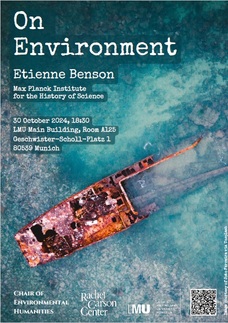Dust Bowl Liberalism and the 'Swing to the Quantitative’ in the Earth Sciences, 1933-1963
We kindly invite you to the guest lecture of Etienne Banson (Max Planck): Oct, 30, 6.30 pm, at the LMU Main Building, room A125
10.10.2024
 In the 1920s, scientists and conservationists in the United States generally agreed that the arid landscapes of New Mexico, Arizona, and other parts of Southwest had been eroding at an accelerating pace since the late nineteenth century, with potentially catastrophic consequences for agriculture. But explanations for the erosion crisis differed widely. On one side were progressive foresters and conservationists such as Aldo Leopold, who argued that poor farming practices and overgrazing were to blame. On the other side were geologists such as Kirk Bryan, who argued that climatic change — driven by natural cycles, not by human activities — was the primary culprit. At stake in this disagreement was not only a scientific question about the causes of environmental change but also a political and ethical question about human responsibility. In this talk, I argue that the dual crises of the Dust Bowl and the Great Depression — and the way science was mobilized to meet them under the New Deal programs of Franklin Delano Roosevelt — shifted the political and epistemic grounds for the debate, changing the way scientists in the United States sought to quantify and allocate responsibility for catastrophic environmental change. These developments in the crisis-ridden decade of the 1930s shaped the postwar relationship between science and conservation policy, including efforts to grapple with the emerging issue of anthropogenic climate change.
In the 1920s, scientists and conservationists in the United States generally agreed that the arid landscapes of New Mexico, Arizona, and other parts of Southwest had been eroding at an accelerating pace since the late nineteenth century, with potentially catastrophic consequences for agriculture. But explanations for the erosion crisis differed widely. On one side were progressive foresters and conservationists such as Aldo Leopold, who argued that poor farming practices and overgrazing were to blame. On the other side were geologists such as Kirk Bryan, who argued that climatic change — driven by natural cycles, not by human activities — was the primary culprit. At stake in this disagreement was not only a scientific question about the causes of environmental change but also a political and ethical question about human responsibility. In this talk, I argue that the dual crises of the Dust Bowl and the Great Depression — and the way science was mobilized to meet them under the New Deal programs of Franklin Delano Roosevelt — shifted the political and epistemic grounds for the debate, changing the way scientists in the United States sought to quantify and allocate responsibility for catastrophic environmental change. These developments in the crisis-ridden decade of the 1930s shaped the postwar relationship between science and conservation policy, including efforts to grapple with the emerging issue of anthropogenic climate change.
This guest lecture is part of the Lecture Series ON ENVIRONMENT, hosted by Prof. Dr.-Ing. Sonja Dümpelmann (RCC Munich)



